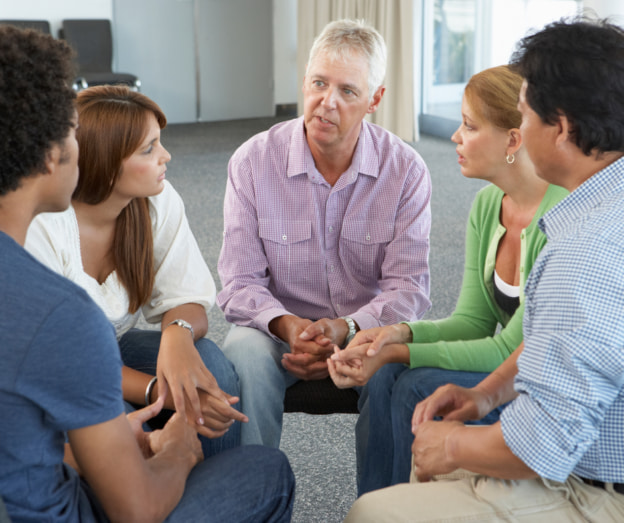Key Takeaway:
- Family support groups provide a safe, supportive space for individuals and families facing similar challenges to connect with one another, share experiences, and find healing through community.
- Specialized support groups, such as those for parents of special needs children, parents of children with mental illness, and parents of children struggling with addiction, can provide tailored resources and understanding to better meet the unique needs of each family.
Navigating the path of a loved one’s addiction or mental health journey can be an isolating and challenging experience. Family support groups aim to combat this isolation and provide an avenue for shared understanding, connection, and healing. This article will guide you through the importance of family support groups, their benefits, and how to find the right one for you.
Defining Family Support Groups: What They Are and What They Offer
Family Support Groups are a vital resource for individuals and families experiencing challenges in various capacities. These groups provide emotional, practical, and social support for those who need it most. Family support groups offer a safe space where individuals can come together to share their experiences, receive validation, and learn from one another.
Family support groups work by connecting individuals with others who have undergone similar situations or challenges. Members of these groups have shared experiences that allow them to provide emotional support because they understand how it feels to be going through the same situation. In addition to this emotional support, family support groups also provide practical advice on how to navigate commonly shared issues like finding resources, seeking legal help, or accessing appropriate medical care.
What sets family support groups apart is the sense of belonging that members feel when they become a part of these communities. Unlike other forms of professional counseling or therapy where there is an inherent power dynamic between the therapist/counselor and the patient/client; family support groups operate based on equality and mutual respect among members.
Interestingly, family support groups first originated as self-help movements from marginalized communities in the 1970s when people started uniting over a shared experience or struggle like addiction recovery, mental health issues, or lost loved ones. Since then, these grassroots initiatives have turned into mainstream programs for anyone seeking help or validation irrespective of their background.
The struggles don’t just end once we find ourselves within a family support group – finding connection and healing amongst others who have undergone similar situations is just one part of joining a group that helps participants recover amidst struggle. So let’s move ahead to discover the Benefits of Joining a Support Group that will help you reap more than just validation for your struggle.
Discovering the Benefits of Joining a Family Support Group For Addiction
Discovering the Benefits of Joining a Family Support Group can be a life-changing experience for those who have struggled to cope with various challenges. Here are six points that highlight the benefits of joining such a group:
- Firstly, these groups offer a sense of belonging to people who might feel isolated and alone in their struggles.
- Secondly, they provide a safe space for members to share their experiences and emotions without hesitation or judgment.
- Thirdly, being part of such a group allows members to learn from each other’s experiences and gain new insights into their own situations.
- Fourthly, family support groups encourage members to build meaningful and positive relationships with others going through similar situations.
- Fifthly, these groups often offer valuable resources and information related to different aspects of care giving that might not be available elsewhere.
- Lastly, joining a family support group can be an empowering experience that helps individuals reclaim control over their lives and regain hope for the future.
However, discovering the benefits of joining a family support group is not as simple as just attending meetings or signing up for one online. It involves finding the right group that fits your needs and provides the necessary support. It is essential to have detailed information about the various types of family support groups available.
When it comes to locating the right family support group, there are some tips I have found useful:
- Seek recommendations from people who have experienced similar situations;
- Research well by checking local listings or online directories;
- Consider location and accessibility when deciding on which group meets your needs;
- Think about how structured you would like the meetings;
- Ask yourself whether you need options such as virtual meetups or in-person gatherings.
Types of Family Support Groups For Addiction: Finding the Right Group for You
Family support groups are a powerful way to find a sense of connection, support and understanding with others who share similar experiences. In this section, we’ll explore the different types of family support groups available out there. Here are some of the most common family support groups:
- Al-Anon and Alateen: Al-Anon Family Groups, including Alateen for younger members, provide support for family members and friends of individuals struggling with alcohol addiction.
- Nar-Anon: This is a 12-step program designed to help relatives and friends of addicts recover from the effects of living with an addicted relative or friend.
- Families Anonymous: This is a 12-step program for family members of individuals with drug abuse or related behavioral problems.
- Adult Children of Alcoholics (ACoA): ACoA helps adults who grew up in alcoholic or dysfunctional homes.
- Co-Dependents Anonymous (CoDA): CoDA is a fellowship of men and women whose common purpose is to develop healthy relationships, often relevant for those who have been in a co-dependent relationship with an addict.
- SMART Recovery Family & Friends: This is a science-based, secular alternative to Al-Anon and Johnson Intervention. Their method is based on the tools of Cognitive Behavior Therapy (CBT) and Motivational Interviewing (MI).
- Parents of Addicted Loved Ones (PAL): PAL provides hope and support through addiction education for parents dealing with alcohol or drug addicted children.
- Codependents of Sex Addicts (COSA): COSA is a recovery program for men and women whose lives have been affected by another person’s compulsive sexual behavior.
- S-Anon: S-Anon is a program of recovery for those who have been affected by someone else’s sexual behavior.
Preparing for a Family Support Group: Getting the Most Out of Your Experience
Setting Personal Goals and Expectations is an important step when preparing for a family support group. Before attending a support group, it’s essential to have a clear idea of why you are going and what you want to achieve. This will help you make the most out of the experience and ensure that your needs are met.
- Identify Your Goals – The first step in setting personal goals and expectations is to identify what you hope to achieve from attending a family support group. This could be emotional support, information sharing, coping strategies, or simply connecting with others who share similar experiences.
- Be Realistic – It’s important to set realistic goals that are achievable within the context of the support group. Don’t expect overnight solutions or miracles. The process of healing takes time, and attending a support group is just one step in that journey.
- Communicate Your Goals – Once you have identified your goals, it’s crucial to communicate them with your therapist or group facilitator. They can help guide your expectations and suggest resources that can assist you along the way.
- Reevaluate Regularly – Lastly, evaluate your progress regularly to see if you’re achieving your goals or if you need to adjust them. This could involve seeking additional help from outside sources or redefining expectations based on new insights gained through participation in a family support group.
It’s worth mentioning that setting personal goals and expectations should not be seen as rigid or fixed plans for recovery. Rather, they should serve as guiding principles for navigating the complexities of healing from trauma; flexibility is key when it comes to overcoming challenges associated with mental health struggles.
Understanding the Ground Rules
Understanding the Ground Rules is crucial before attending any family support group. It is necessary to be aware of the expectations and limitations of the group to ensure a positive experience for all members involved. Here is a simple 3-step guide to help you understand the ground rules.
- Familiarize Yourself. Before attending any support group, research about it, and read the group’s rules and guidelines. Acquire knowledge about their procedure, structure, confidentiality policy, and attendance expectations.
- Ask questions. In case of doubts or questions related to the group’s rules, do not hesitate to ask for clarification from the coordinators or facilitators of those groups. They will help you get a clear understanding since they possess extensive experience working with families.
- Follow Regulations. Once you are familiar with their rules and have cleared your doubts, make sure that you follow their regulations diligently throughout your journey in the family support group.
Understanding Ground Rules becomes important for building trust among participants so that they can share openly and comfortably within the shared space without fear of judgment or discrimination. By agreeing on some agreed-upon norms which are mutually acceptable by everyone beforehand, everyone feels reassured that they are safe in a non-judgmental environment despite sharing such sensitive information.
Choosing the Right Family Support Group for Your Needs
Choosing the Right Family Support Group for Your Needs can be a bit confusing and overwhelming. One doesn’t just pick a family support group at random, especially when the objective is to find the right one that caters to everyone’s needs. The following five steps will help you to find a suitable family support group.
- The first step in Choosing the Right Family Support Group for Your Needs is to define your desired outcome. Determine what you hope to achieve by joining a family support group, and make a list of everything you need from it.
- The second step is research. Ask your doctor or therapist if they know of any groups that align with your desired outcome. You can also ask friends or family members if they have attended any support groups before or are aware of any.
- Thirdly, inquire about each prospective support group. Ask questions such as the age and gender ranges they cater to, how frequently they meet, whether there are fees involved or if it’s free, their rules, their philosophy and therapy modality used.
- Attend several meetings before committing yourself or your family. Most groups allow new members to attend a few meetings before deciding on whether to join or not.
- Fifthly and finally, evaluate your initial experience: how inviting was the atmosphere? How authentic were people open about sharing? Did conversations resonate with you? Does it look like somewhere where you will feel safe sharing?
Choosing The Right Family Support Group for Your Needs means selecting one that caters individually and mutually in fulfilling goals set by individuals attending; let me give an example: my husband required medical expertise on Alzheimer’s disease progression while I wanted methods on communication strategies among senior couples experiencing conflict.
Participating in a Family Support Group: Strengthening Connections and Promoting Healing entails more than being present at meetings but actively participating in helping oneself while helping others through peer convergence tools such as sharing experiences, actively listening while maintaining confidentiality & respect-bound protocols.
Participating in a Family Support Group: Strengthening Connections and Promoting Healing
Participating in a family support group can be a transformative experience. Finding a space where you can be open and honest about the challenges you face can help you feel less alone and more understood. In this section, I’ll share my personal experience with family support groups and explore the ways in which they promote healing and strengthen connections. We’ll take a closer look at sharing your personal story with others in the group for connection and understanding, offering support and guidance to fellow members, and the profound impact of joining a supportive community that can provide lifelong relationships.
Sharing Your Personal Story for Connection and Understanding
Sharing Your Personal Story for Connection and Understanding is a powerful tool for building relationships and fostering healing within a family support group. It involves opening up about your personal experiences, feelings, and struggles in a safe and supportive environment. By doing so, you allow others to see the real you and connect on a deeper level.
Sharing stories can be a cathartic experience that brings relief and understanding to both the storyteller and the listener. When we share our stories, we give voice to our emotions, which can help us process them more effectively. We also get to hear other people’s stories, which can broaden our perspectives on various issues.
In addition to providing emotional support, sharing personal stories can also lead to problem-solving. For example, if one member of the group has found a helpful coping strategy, they may share it with others who are struggling with similar issues.
It’s important to note that sharing personal stories can be difficult and uncomfortable at first, especially if you’re not used to being vulnerable in front of others. However, many participants find that once they start sharing their stories, they feel heard and validated in ways they never have before.
Offering Support and Guidance to Others in the Group
Offering support and guidance to others in the group can be a powerful tool in building connections and promoting healing within a family support group. By openly sharing our experiences and offering insights or advice, we can create a safe space where everyone feels heard and supported.
In these groups, members often find comfort in knowing that they’re not alone in their struggles. When one person opens up about their personal experience, it gives others permission to share their own stories, which can lead to deeper discussions and greater understanding. This process of emotional sharing helps build trust and connection between members of the group.
But offering support isn’t just about listening – it’s also about contributing your own thoughts and ideas. By sharing our knowledge and experiences, we can help other group members navigate difficult situations or provide new perspectives on old problems. This kind of mutual support is one of the cornerstones of family support groups, creating a sense of community that can help promote healing for everyone involved.
One valuable tip when offering support is to avoid giving unsolicited advice. It’s important to remember that each member is on their own unique journey, so what works for one person may not work for another. Instead of trying to solve someone else’s problems or impose your own beliefs, it’s often more helpful simply to listen and offer empathy. Sometimes all someone needs is a sympathetic ear.
Now that you understand the value of offering support and guidance within a family support group, let’s dive into the next step: joining the community and building lifelong relationships.
Joining the Community and Building Lifelong Relationships
Joining the community and building lifelong relationships may be one of the best decisions a person can make. It may seem like a simple concept, but its impact is profound. It entails discovering and getting involved in social events, groups, or organizations that share similar values, hobbies or interests as you do.
When you step out of your comfort zone and dive into new communities, it can open up a whole new world of possibilities where you will meet like-minded individuals who are passionate about what you are passionate about. Joining a family support group is one way to start building those connections.
Through these groups or organizations, people come together to offer each other emotional support, share their experiences and stories with others who understand what they are going through. The benefits go beyond just friendship or social connectedness; it also helps to relieve feelings of isolation and helps increase resilience levels.
When joining a supportive community, people may find that they receive validation from their peers on some of their most vulnerable concerns. They find comfort knowing that they are not alone in their struggles, emotions or crisis situations. Sharing common experiences also fosters empathy among members of the group which can lead to stronger relationships.
We at The Ridge offer a comprehensive family support group program to aid recovery. Apart from that, inpatient rehab facility and detox treatment are also available for people struggling with substance abuse.
Five Facts About Family Support Groups: Finding Connection and Healing with Others Who Understand:
- ✅ Family Support Groups provide a safe and supportive environment for individuals and their families who are dealing with mental health challenges. (Source: National Alliance on Mental Illness)
- ✅ These groups often include peer-led discussions, education, and coping skills development. (Source: Mental Health America)
- ✅ Family Support Groups can be found through local mental health organizations or online communities. (Source: NAMI)
- ✅ These groups can help reduce stress and anxiety for both the individuals dealing with mental health challenges and their families. (Source: Mayo Clinic)
- ✅ Family Support Groups can provide a sense of community, connection, and shared experience that can lead to healing and growth. (Source: NAMI)
FAQs about Family Support Groups: Finding Connection And Healing With Others Who Understand
What are family support groups and how do they work?
Family support groups are meetings where families who are dealing with similar challenges can come together to share their experiences, find emotional support, and learn from each other. They work by providing a safe and confidential space for individuals to connect with others who understand what they are going through. These groups can be led by mental health professionals, advocates or peers who are trained in facilitating discussions.
Who can benefit from family support groups?
Family support groups can benefit anyone who is dealing with the stress, uncertainty, and emotional toll that often come with caring for a loved one with a chronic illness, disability, addiction, or any other challenge. These groups can be helpful for parents, siblings, children, partners, relatives, and close friends of those who are struggling.
What are the benefits of joining a family support group?
The benefits of joining a family support group include reduced isolation, increased social support, learning new coping strategies, and access to useful resources. Members often find comfort in knowing that they are not alone in their struggles and can receive support and encouragement from others who have been in similar situations.
How can I find a family support group near me?
To find a family support group in your area, you can start by contacting local mental health organizations, support groups, community centers, or social service agencies. You can also search online for national or local organizations that offer support groups or browse social media groups. The important thing is to find a support group that meets your specific needs and is located within your available time and area.
What should I expect during a family support group meeting?
During a family support group meeting, you should expect that there is usually an introduction, where members introduce themselves, followed by group discussion and the sharing of experiences. Members also receive information or resources on topics of interest specific to the group. It is important to note that family support groups provide a safe space, and confidentiality is respected.
Can I attend a family support group even if I do not feel comfortable sharing my story?
Yes, you can attend a family support group even if you do not feel comfortable sharing your story. It is common for some members to choose to listen or observe during the first few meetings until they feel comfortable sharing. Group facilitators also understand the importance of respecting members’ privacy and emotions.






